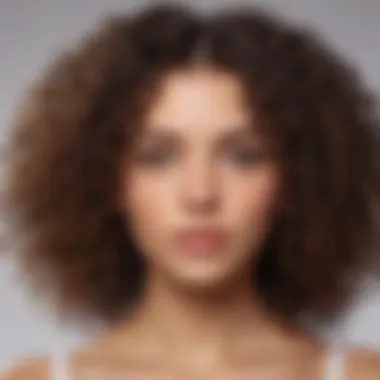Effective Techniques for Curly Hair Care: Embrace Your Curls


Insider Beauty Tips
Curly hair is unique and requires a specialized care routine to maintain its health and enhance its natural beauty. Understanding the different types of curls is crucial in determining the most effective way to care for them. From loose waves to tight coils, each curl pattern demands specific attention and products. By identifying your curl type, you can tailor your hair care regimen to meet its individual needs accurately.
Haircare Secrets Incorporating the right techniques into your daily hair care routine can make a significant difference in the appearance and health of your curls. Techniques such as the LOC method (Leave-in, Oil, Cream), plopping, finger-coiling, and diffusing can help define curls, reduce frizz, and retain moisture. Additionally, regular deep conditioning treatments, sulfate-free shampoos, and silicone-free products are essential for maintaining curly hair's vitality and preventing dryness.
- Beauty Hacks Maintaining curly hair requires continuous hydration and protection. Using a satin or silk pillowcase can minimize friction and frizz while retaining moisture in the hair strands. Wrapping hair in a silk scarf or bonnet during sleep can also help preserve curls and prevent breakage. Furthermore, incorporating a pre-shampoo treatment with oils like coconut, argan, or jojoba oil can nourish and strengthen curly hair, promoting healthy growth and luster.
Understanding Curly Hair
Curly hair is a unique hair type that requires specific care and attention. In this article, understanding curly hair is pivotal as it lays the foundation for effective hair care routines. By comprehending the different types of curly hair, individuals can tailor their hair care practices to suit their specific needs. Embracing the intricacies of curly hair allows for the adoption of suitable products and techniques, leading to healthier and more vibrant curls. This section serves as a fundamental guide for anyone looking to enhance their curly hair experience.
Different Types of Curly Hair
Type 2: Wavy Hair
Wavy hair, categorized as Type 2 in the curly hair spectrum, features loose, defined S-shaped waves. This type of hair is versatile and often considered the gateway between straight and curly hair textures. Type 2 hair is known for its natural volume and can hold various styles well. While it may require less maintenance than tighter curls, wavy hair benefits from proper hydration and styling to maintain its wave pattern and vibrancy. Understanding the characteristics of Type 2 hair is crucial for selecting appropriate products and techniques to enhance its natural beauty.
Type 3: Curly Hair
Curly hair, classified as Type 3, is characterized by well-defined loops or spirals. This hair type tends to be prone to frizz yet can showcase remarkable bounce and volume. Type 3 curls require moisture-rich products to maintain their shape and prevent dryness. Embracing the unique features of Type 3 hair allows individuals to embrace their curls confidently, showcasing their natural texture and vitality. Discovering the intricacies of Type 3 curls empowers individuals to customize their hair care routine for optimum curl definition.
Type 4: Coily Hair
Coily hair falls under Type 4 and is distinguished by tight, densely packed curls or zig-zag patterns. This hair type thrives on consistent moisture and gentle handling to prevent breakage and retain length. Type 4 hair coils beautifully when well-moisturized, reflecting a stunning display of natural texture and depth. Understanding the distinct characteristics of Type 4 hair is crucial for nurturing coils, promoting healthy growth, and showcasing the beauty of natural kinks and coils.


Characteristics of Curly Hair
Porosity
Hair porosity refers to its ability to absorb and retain moisture. Understanding porosity helps in selecting the right products and treatments to maintain optimal hydration levels for curly hair. High porosity hair may absorb moisture quickly but struggle to retain it, while low porosity hair requires products that can effectively penetrate the hair shaft. Balancing porosity is essential for promoting healthy curls and preventing issues like frizz and breakage.
Density
Hair density relates to the number of strands on the scalp, influencing overall volume and fullness. Curly hair often appears thicker due to its natural texture, but density varies among individuals. Recognizing the density of curly hair aids in selecting appropriate styling techniques and products to enhance volume or reduce bulk. Understanding density allows individuals to create beautifully styled looks that complement their hair's natural thickness and texture.
Elasticity
Elasticity refers to the hair's ability to stretch and return to its original length without breaking. For curly hair, elasticity is crucial as it helps assess the hair's health and resilience. Adequate elasticity indicates well-nourished hair that can withstand styling and manipulation without damage. Understanding the elasticity of curly hair guides individuals in choosing products that maintain elasticity, promoting flexibility, and minimizing breakage. Incorporating elasticity-focused techniques ensures that curls remain strong, defined, and resistant to damage.
Essential Haircare Tips for Curly Hair
Understanding the vital importance of proper haircare is crucial in the realm of curly hair maintenance. Essential haircare tips play a pivotal role in managing and enhancing the natural beauty of curly locks. By implementing a tailored haircare routine, individuals can nurture their curls effectively. The significance of essential haircare tips lies in their ability to address the specific needs of curly hair, such as hydration, moisture retention, and overall health. These tips not only assist in maintaining the natural curl pattern but also promote hair strength and vitality, crucial in the journey to healthy and radiant curls.
Washing and Conditioning
Co-washing
Co-washing stands out as a distinctive aspect of curly hair care routines. This method involves using a conditioner to cleanse the scalp and hair without stripping away natural oils. The key characteristic of co-washing is its gentle cleansing action, which helps retain moisture and prevent dryness commonly experienced by individuals with curly hair. Co-washing is a popular choice in this article due to its ability to provide hydration while keeping the hair soft and manageable. Its unique feature lies in its minimal use of harsh detergents, resulting in less frizz and increased shine. However, it is essential to note that overuse of co-washing can lead to product buildup and scalp issues, emphasizing the importance of a balanced approach in incorporating this method into the haircare routine.
Deep Conditioning
Deep conditioning is a fundamental practice in nurturing curly hair. This process involves using a highly moisturizing conditioner to provide intense hydration and nourishment to the hair. The main characteristic of deep conditioning is its ability to penetrate the hair shaft, repairing damage and restoring elasticity. Deep conditioning is a popular choice in this article due to its effectiveness in combating dryness and frizz, common concerns for individuals with curly hair. The unique feature of deep conditioning is its ability to revive dull, lifeless curls, leaving them soft, smooth, and more manageable. While the advantages of deep conditioning are significant in promoting healthy curls, excessive use can lead to overly soft hair and potential buildup, highlighting the need for moderation and proper application techniques to maximize its benefits.


Detangling Techniques
Detangling techniques are essential skills in managing curly hair effectively. These methods involve gently removing knots and tangles from the hair without causing breakage or damage. The key characteristic of detangling techniques is their ability to prevent hair breakage and minimize stress on the strands. Utilizing appropriate tools such as wide-tooth combs or fingers, these techniques aid in maintaining the curl pattern and enhancing overall hair health. Detangling techniques are a beneficial choice in this article because they contribute to smoother styling and reduced hair loss. Their unique feature lies in promoting hair elasticity and preventing hair damage, resulting in stronger, more resilient curls. However, improper detangling methods can lead to increased breakage and split ends, underscoring the importance of gentle and patient detangling practices for optimal haircare results.
Recommended Haircare Products
Haircare products play a pivotal role in managing and maintaining healthy curly hair. They are essential for nurturing, hydrating, and styling curls effectively. Understanding the significance of using proper haircare products is crucial in achieving desired results. Curly hair requires specific formulations to cater to its unique needs, such as moisture retention, definition, and frizz control. Incorporating the right products into your haircare routine can enhance the overall health and appearance of your curls.
Shampoos and Conditioners
Sulfate-Free Shampoos
Sulfate-free shampoos have gained popularity in the curly hair community due to their mild and gentle cleansing properties. They are formulated without harsh sulfates that can strip natural oils from the hair, making them ideal for maintaining moisture levels in curly hair. By using sulfate-free shampoos, individuals can prevent excessive dryness and breakage, promoting healthier hair growth and less frizz. While sulfate-free shampoos may produce less lather compared to traditional shampoos, they are beneficial for preserving the natural oils and texture of curly hair.
Moisturizing Conditioners
Moisturizing conditioners are essential for curly hair due to their hydrating and nourishing properties. They help restore moisture balance, prevent tangling, and improve hair elasticity. By using moisturizing conditioners, individuals can enhance the softness and manageability of their curls. These conditioners contain ingredients such as natural oils, shea butter, and glycerin, which aid in retaining moisture and sealing the hair cuticle. Regular use of moisturizing conditioners can contribute to reducing frizz, enhancing curl definition, and promoting overall hair health.
Clarifying Shampoos
Clarifying shampoos are designed to remove buildup, residue, and impurities from the hair and scalp. They deep clean the hair follicles, eliminating product buildup and excess oils that can weigh down curly hair. Clarifying shampoos are beneficial for individuals with oily scalp conditions or those who use heavy styling products regularly. While clarifying shampoos provide a thorough cleanse, it is advisable to use them occasionally to prevent stripping the hair of essential oils and moisture. Balancing clarifying shampoos with moisturizing products is crucial to maintain the health and hydration of curly hair.
Styling Products
Styling products are instrumental in creating desired looks and textures for curly hair. They aid in defining curls, reducing frizz, and enhancing shine. Choosing the right styling products based on hair texture, porosity, and style preferences can significantly impact the outcome of hairstyling efforts. By incorporating curl-enhancing creams, gels, and mousses into the styling routine, individuals can achieve long-lasting hold, volume, and style versatility. Understanding the unique properties and benefits of each styling product is key to developing a customized haircare regimen that suits individual needs.
Curl Enhancing Creams


Curl enhancing creams are formulated to define and moisturize curls, promoting bounce and resilience. They provide medium to strong hold without stiffness, allowing for natural movement and flexibility. Curl enhancing creams contain ingredients like shea butter, coconut oil, and botanical extracts that nourish and enhance the curls' natural pattern. By applying curl enhancing creams to damp hair and scrunching or finger-coiling, individuals can achieve enhanced curl definition and reduced frizz for a polished look.
Gels and Mousses
Gels and mousses are styling products that offer varying levels of hold and definition for curly hair. Gels provide a strong hold, ideal for controlling frizz and maintaining curl shape, while mousses offer a lighter hold, suitable for adding volume and texture. Both products help set and style curls while providing protection against humidity and environmental factors. Choosing between gels and mousses depends on individual preferences and styling goals, whether it's defined curls, enhanced volume, or long-lasting hold.
Leave-In Conditioners
Leave-in conditioners are versatile products that hydrate, detangle, and protect curly hair throughout the day. They serve as a moisture barrier, preventing dryness and breakage while enhancing curl definition and shine. Leave-in conditioners are lightweight and non-greasy, making them suitable for daily use or as a styling aid before applying other products. By incorporating leave-in conditioners into the haircare routine, individuals can maintain hair moisture, reduce frizz, and improve manageability, creating a foundation for effortless styling and long-term hair health.
Healthy Habits for Curly Hair
In this section, we will delve into the crucial aspects of maintaining healthy habits for curly hair. The health of your hair is fundamental in ensuring the strength and vitality of your curls. By adopting a holistic approach to hair care, you can enhance the natural beauty of your curly locks. Understanding the significance of healthy habits in curly hair maintenance is paramount for achieving optimal results.
Balanced Diet and Hydration
When it comes to curly hair care, maintaining a balanced diet and hydration are key pillars for healthy hair growth and overall well-being. Nutrient-rich foods play a vital role in providing essential vitamins and minerals that promote hair strength and resilience. Incorporating a variety of nutrient-rich foods such as leafy greens, fruits, and lean proteins can significantly impact the quality of your curls.
Nutrient-Rich Foods: Nutrient-rich foods are a powerhouse of essential nutrients like vitamins A, C, E, and biotin, all of which contribute to healthy hair growth. Including foods rich in omega-3 fatty acids like salmon and walnuts can also boost hair health. These foods aid in nourishing the scalp and enhancing hair texture, making them an ideal choice for those looking to improve their curls.
Drinking Sufficient Water: Hydration is key for maintaining the moisture levels in your hair. Drinking an adequate amount of water daily helps in keeping your curls hydrated from within, resulting in reduced breakage and increased elasticity. Water also aids in flushing out toxins from the body, promoting overall hair health. Incorporating this simple habit can go a long way in improving the appearance and texture of your curly hair.
Hair Supplements: For individuals experiencing specific hair concerns or deficiencies, hair supplements can be a beneficial addition to their routine. Supplements containing biotin, vitamin D, and collagen are known to promote hair strength and growth. However, it is advisable to consult with a healthcare professional before incorporating supplements to address individual needs and ensure their suitability for your curly hair care regimen.
Protection from Environmental Damage
Protecting your curly hair from environmental damage is essential to prevent any potential harm caused by external factors. Environmental aggressors like UV radiation, heat styling, and harsh chemicals can adversely affect the texture and health of your curls. Implementing protective measures can safeguard your hair from environmental stressors, allowing it to thrive in its natural state.
UV Protection: UV protection is crucial for shielding your curls from the harmful effects of the sun's rays. Exposure to UV radiation can lead to dryness, brittleness, and color fading in curly hair. Using hair products with UV filters or wearing hats can offer an extra layer of defense against UV damage, preserving the vibrancy and integrity of your curls.
Heat Styling Precautions: Excessive heat styling can cause heat damage, leading to dry, frizzy curls. Using heat styling tools at lower temperatures and incorporating heat protectant products can mitigate the potential adverse effects of heat styling. Opting for heat-free styling methods whenever possible can further protect your curls from heat-induced damage.
Avoiding Harsh Chemicals: Harsh chemicals present in some haircare products can strip the hair of its natural oils, resulting in dryness and damage. Opting for gentle, sulfate-free shampoos and silicone-free conditioners can help maintain the health and appearance of your curls. Additionally, avoiding products containing sulfates, parabens, and alcohol can prevent unnecessary stress on your hair strands, promoting overall curl health.







